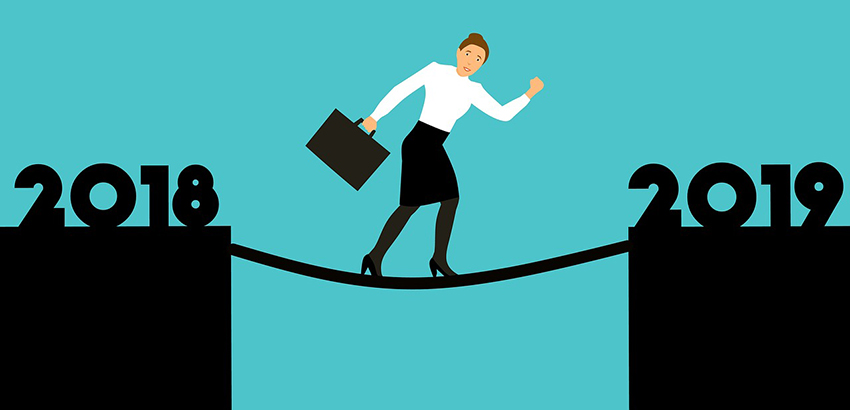A fascinating year is about to end. It is only another few days before 2019 starts. There are two things that you can do:
- Make a powerful entry into 2019; or,
- Float into 2019 and happen to simply show up in the New Year.
I am inviting you to make a powerful entry into the New Year and make 2019 the best year you’ve had till now. If that’s what you are interested in, read on.
So that you can make an authoritative and a commanding entry in the New Year, I invite you to do a review of the last year (2018) and take stock. Below, I recommend a set of questions that you ask yourself. I have broken these questions into 2 parts – one that reviews and completes 2018 and another set that helps you make new declarations for the New Year.
It might be useful to know ‘What is so’ about your life at the end of 2018; and then, as a matter of your creation, ‘where will you be this time next year’ so that you can make an powerful entry into 2019 and achieve your promises for the New Year.
Here are the 6 essential questions for you. I am suggesting these questions to you after having completed this exercise for 5 consecutive years in a row, and I can state out of experience, once you have done so, you will be making a very powerful entry in to the New Year. Not only that, if you act inside of your commitments, you will make 2019 your best year yet. I have immensely benefited from this exercise in the last few years and I urge you to do so for the sake of your life too.
1. What have you achieved in 2018?
While answering this question, what I did was to look at different areas of my care, such as my personal life; my work; my health & well-being; and Gift Your Organ Foundation (the NGO that I co-founded 8 years ago), and in each of these cares, what did I achieve.
Just writing down my accomplishments in each of these areas gave me a great sense of achievement and a lot of power to declare audacious and bold goals for the New Year!
I suggest you identify the important areas of your life and list out your achievements in each of your areas of care.
2. What did you learn new in this year?
Learning is not only about new knowing or simply gaining new knowledge. Learning is about doing new actions and new practices – through which expanding your capacity to act and to generate new results.
I reflected on what new practices did I commit to in the last year. By learning new leadership practices, I have shifted my capacity for action (and hence, more importantly, my capacity to deliver results).
I am inviting you to review this too. This will help you get present to your new capacity to generate results. In the event, you did not commit to any new practices in the last year, then no problem – we have a chance to make commitments for the New Year, and we will do so below.
3. What is it that you want to acknowledge yourself for in this Year?
We perpetually see the good in others and compare ourselves to others. No wonder then that most times we fall short. This is the time of the year to step back for a few moments and pat yourself on the back for all the good that you are and all the good that you have done. I made a detailed list of points that I wanted to acknowledge myself for. I encourage you to look back in your year and acknowledge yourself / pat yourself on your back. It doesn't matter how big or small it is.
4. What is it that you missed out on this year?
This year too, I missed out on a few promises and certain self-development goals. By simply distinguishing what I missed out in the last year, has helped me re-evaluate my promises.The ones that continue to hold importance in my life have found a place in what are my promises for 2019 (the next question). Some promises I have chosen to revoke because they do not mean much to me anymore.
5. What are your promises for 2019?
There are two ways to approach any promise in your life – one is to first identify ‘what’ is your promise and then figure out the ‘how’. The other is to first look at the resources that you have, the effort that it will take, and then determine your promise.
A lot of people first look at the ‘how’ and based on the `how’, they decide the ‘what’, i.e., their promise.
I am a firm believer that you need to figure out the ‘what’ first and the ‘how’ will start to reveal itself once you get into action. It’s pretty much like driving in dense fog. When you leave your home, you know where you want to go (your promise), but you cannot see the road. You commit to driving. You can see only a few feet ahead. However, when you travel the few feet, you see the next few feet.
Commit to action. Take the first step. Subsequent steps will automatically open up. Waiting to see the entire path before you take the first step will lead you to one of two things; inaction, or setting small goals.
Think of all the areas that you care for; in each area think of where you would like to be this time next year; make promises in these areas; make these promises specific, measurable and put a deadline. If you bring in intention and action, nothing can stop you from achieving your promises for 2019.
6. What new will you learn in the New Year?
And finally, I have made my own Personal Development Plan for 2019. There is specific new knowledge that I have committed to knowing; and as importantly, some specific practices that I have committed to – my promise to myself is that my capacity this time next year would have enhanced significantly in areas that matter to me. I invite you to design your capacity, by identifying what new you will learn, through practice, in 2019.
Feel free to add more questions if you would like. The more you question yourself, the more you will seek answers from yourself.
Once you have done this, I invite you to share your promises with some one who can hold you accountable. If you have a learning team, share these promises with your learning team. Create a structure of people around you who continuously support you in fulfilling your promises.
I have created a solid structure of people around me that hold me to account. If you would like to create a similar structure, please feel free to contact me on sameer@sameerdua.com. I would be delighted to support you.
I can guarantee you, once you have done this, you will not only make a powerful entry in 2019, you will conquer the New Year!
Make 2019 count in your life!
Good luck and have a blast!
(This blog post is simply modified from similar blog posts posted at the end of earlier years. However, I have re-done, in complete, the exercise of answering the questions mentioned above. I encourage you to do so too and see the value for yourself :))
Sameer Dua, Founder Director, Institute for Generative Leadership, India
Schedule a Conversation
Please help us with your details.







